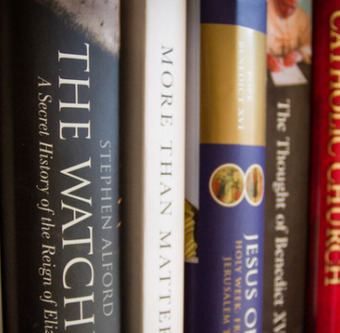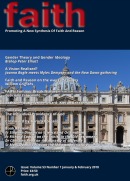
Book Review - New light on the Trinity from the Old Testament
The Birth of the Trinity: Jesus, God, and Spirit in New Testament and Early Christian Interpretations of the Old Testament by Matthew W. Bates, Oxford University Press, xii + 234 pp. , £46.99 (hardback), £15.23 (paperback).
reviewed by Richard Conrad
Reading a book such as this, I feel that a light has been switched on. Professor Bates helps us see a way in which the New Testament speaks of the Holy Trinity: it recognises the Divine Persons speaking to or about each other in certain Old Testament texts. The book’s title, The Birth of the Trinity, in fact understates the support it gives to the claim that the doctrine of the Trinity was not developed by the Church on slender foundations, but is found with significant richness in the New Testament.
Bates perceptively reviews alternative accounts of the ‘emergence’ of the Trinity in Chapter 1, and then reminds us that some Church Fathers practised ‘prosopological exegesis’ of Old Testament texts, prosopon being the Greek equivalent of the Latin persona. For example, in Psalm 110:1 (‘The Lord said unto my Lord, “Sit at my right hand…”’) Tertullian finds the Holy Spirit speaking about the Father speaking to the Son. Discerning in whose persona certain words are spoken was a contemporary approach to awkward texts. Few scholars trace this form of exegesis back to the New Testament itself. Bates’ great merit is to expound, in careful detail, New Testament instances of prosopological exegesis, helping us recognise them for what they are.
Theodrama
We have known there is typology in the New Testament and the Early Church; Bates invites us to recognise ‘theodrama’. He explains (pp. 34-36) that a Prophet could be elevated by the Spirit to speak in the persona even of a Divine Person. Thus in some utterances we ‘overhear’ a conversation taking place in one setting, about an event taking place at some other time. In Isaiah 50:6 (‘I set my back for whippings…’), the Prophet takes on the persona of the Ascended Christ speaking to his Father about the Passion to which he had submitted.
In Mark 12:35-37 Jesus proposes a prosopological exegesis of Psalm 110:1. Given the debates about what sayings can be securely attributed to the historical Jesus, Bates prudently refrains from arguing at length that Jesus promoted this way of finding himself, his Father and their Spirit in the Old Testament; he seeks only to demonstrate that New Testament authors practised it.
Though some of Bates’ exegeses are hard work to follow, they repay the effort. His discussion of Jesus’ use of Psalm 22 (‘My God, my God, why have you forsaken me?’; pp. 126-135) is especially illuminating. However, unlike him, I do not find the note of despair in either the Psalm or the Gospel accounts of the Passion.
Bates holds, plausibly, that prosopological exegesis gave rise to the use of persona in Trinitarian theology. His claim that ‘“person” is a God-granted and hence divinely approved metaphor’ (p. 37) is overstated: in the New Testament prosopon typically means ‘face’, and is used in expressions for personal presence. Twice it refers to (human) persons; never to Father, Son and Spirit in relation to each other. Despite the implication on pp. 11 and 24, it is not used in the Nicene or Apostles’ Creed!
Persons
As Bates admits, caution about the word ‘person’ is in order: ‘all … metaphors are an accommodation to our creaturely limitations, and as such they do not directly capture God’s ultimate reality’ (p. 37; cf. pp. 3-4). When speaking ‘of “persons” … beware of … anachronistically foisting contemporary notions of the person onto the ancient texts, especially since most modern Westerners tend to focus on the person as the center of individual psychological consciousness…’ (p. 37). Very true: to think of the Divine Persons as three ‘subjects’ who each possess a mind and a will, and ‘happen to agree’, is contrary to received doctrine. There is one Divine Mind, one Divine Will, identical to the one Divine Being which each of Father, Son and Spirit possesses fully. Further, Aquinas reminds us there is no such thing as ‘divine personhood’ that occurs more than once: there is one Fatherhood, one Sonship, one ‘proceeding as Love’. As Augustine had seen, the tres Personae formula is ‘shorthand’ for something far richer.
Bates seems insufficiently cautious about presenting the Divine Persons as three ‘subjects’. On pp. 134-5 he speaks of ‘the raw, edgy, surprisingly candid intimacy of expression … permitted between the divine persons within the Godhead.’ He adds that when we move to a consideration of the Trinity in itself, ‘this “conversation” must be treated as an imprecise anthropomorphic (but nonetheless God-given!) metaphor for a higher reality.’ But then he insists ‘our constructive descriptions of the interpersonal dynamic between Father, Son, and Spirit must … find a way to foreground such words of gritty relational transparency.’
Dogmatic tradition helps
Though he speaks of ‘timeless, intimate communion within the Godhead’ (p. 3), the order of Bates’ chapters gives the impression of a single history involving the Person of the Son, envisaged as a single consciousness. The pre-existent Son and the Father discussed strategy in ‘the time before time’ (pp. 41, 85, 89). Later, the same consciousness spoke to the Father from the earth; now it speaks to him in heaven after a ‘joyful reunion’ (p. 160). A distinction offered by the dogmatic Tradition would help better guard the truth that the eternal Trinity totally transcends time: the Triune God, as God, has no history. Chalcedon, reinforced by Constantinople III, recognises in Christ incarnate a true human mind and will – human forms of consciousness, if we must speak that way – distinct from the Divine Mind and Will. Christ’s human psyche began to exist at the moment of his Conception – it has a history, but no pre-history.
It would take another book to defend afresh the fidelity to Scripture of this dogmatic Tradition; nevertheless, explicitly recognising the distinction of natures in Christ would assist Bates. On pp. 85-87 he analyses Hebrews 10:5-10, which, he points out, presents Christ as saying to the Father, ‘A body you prepared for me … I have come … to do your will,’ at the moment of the Incarnation. These words of Psalm 40:6-8, attributed to Christ by prosopological exegesis, should, I contend, be heard as spoken by Christ in his humanity. They express the love and obedience in his human will and mind, already ‘full of grace and truth’. This analytical tool can help with further texts.
More to ponder
So, as Bates accepts, further work remains. He has done us the great service of alerting us to a key way in which the New Testament invites us to hear the Holy Trinity speaking. The data and detail he gives us can be brought into conversation with other ways Scripture speaks of the Trinity. Further, the texts Bates helps us penetrate afresh need – as do all Scriptural texts – to be repeatedly pondered; and for this task, the concepts, distinctions and guidelines offered by the dogmatic Tradition can help. In particular, we might explore how Jesus’ immensely graced human words, deeds and sufferings, love and obedience, prayer and sacrifice, are the ‘incarnation’ of his eternal, divine Sonship. This will ensure we do not presume ‘directly [to] capture God’s ultimate reality,’ or risk giving the impression that the Trinity really is merely three great people. At the same time it will show us what it means to live out the share in Christ’s Sonship that we are privileged to enjoy.
Notes:
Fr. Richard Conrad O.P. has taught theology in the Dominicans and at the Maryvale Institute. He is Director of the Aquinas Institute, Oxford.





